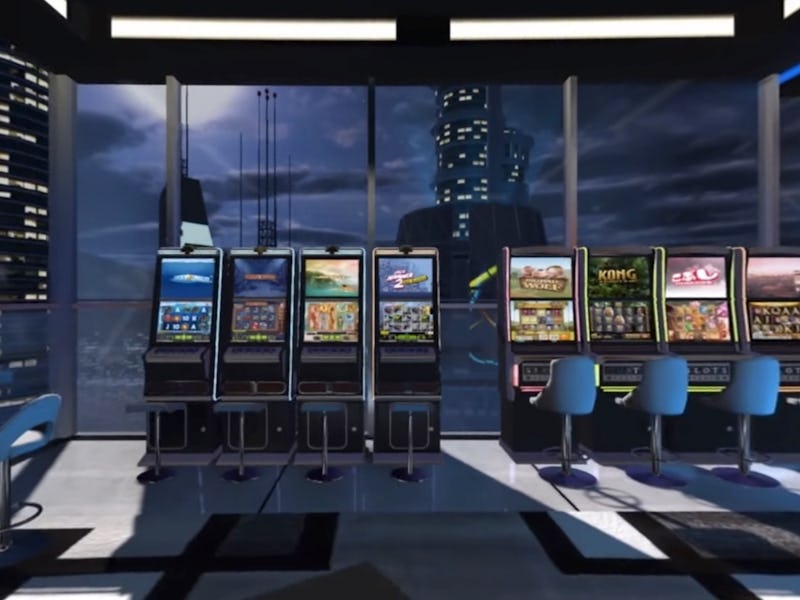Casinos Are Making a Bet on Virtual Reality
What happens in your headset stays in your headset.

Human brains are already wired to enjoy gambling, and there’s evidence that virtual reality is addictive too. What happens when these two powerful entities collide?
Inverse got a glimpse of this intersection at the inaugural VR/A.R. Gambling Conference in Prague this month. The event saw business leaders and technologists from the gambling and virtual reality worlds come together to talk about the present-day state of VR gambling and its potentially lucrative future.
To hear the experts talk about it, virtual reality gambling is bursting with potential. The first virtual reality casino, SlotsMillion VR, has been in operation since 2015; gamblers can interact with each other and play slots and other games in a virtual space — and these will only get more elaborate.
VR could also unlock exciting new games for betting. One conference speaker explained that, nowadays, you’d never bet on the outcome of a sword fight to the death — but in the future you might put two players inside a competitive sword-fighting VR game and wager real money on the outcome.
VR could also give a boost to physical casinos. With a 360-degree camera on every card table at a physical casino, for example, virtual gamblers might participate remotely in the same game as in-the-flesh casino guests. And that kind of setup could certainly change how gambling events like the World Series of Poker are broadcast, letting VR viewers have a live view in any direction at whichever card table they wanted.
At the registration desk for the first-ever VR/AR Gambling Conference.
For now, VR gambling is more fantasy than reality, as some big names at the conference admitted.
Alexandre Tomic, co-founder of the company behind SlotsMillion VR, said his virtual reality casino hasn’t exactly taken off. Without disclosing specific numbers, he said “there’s no business in VR yet,” and he admitted to using it in his own business as “a gimmick.” Tomic is optimistic about the future though, saying VR will reshape everything on a long enough timeline, eventually “doing to mobile what mobile did to desktop.”
Some people are looking to VR to take on other parts of the casino experience, including family-friendly games, parties, shows, and, yes, strippers.
“Millennials don’t care about roulette,” said Disney-Imagineer-turned-VR-consultant Kevin Williams. “That’s something for their grandparents; it holds little sway today as the gaming industry reforms in response to technology. One casino reported that sixty percent of its revenue — more than half — nowadays comes from food and entertainment, not games.”
Williams is a proponent of “mixed reality” — having a VR user interact with limited real-world elements while engaged more immersively in a virtual environment. He showed off a VR-equipped bumper car game he had worked on, in which the drivers and passengers wear full headset gear as they crash into each other. Moving their vehicle through the real world, software tracks participants’ positions in the virtual world, showing them the environment and virtual representations of other players.
So will we be hauling ourselves to virtual parties in Vegas in the future? Perhaps! But we’ll also be partying on the tops of mountains, at the bottom of the ocean, and on the surface of the moon.
A conference attendee tries out a VR experience.
Another big question for the industry is dealing with the “simulation sickness” that some people get when putting on headsets.
Alexander Bragin, virtual reality game designer and CEO of VR2Go, says this happens only when a VR experience is poorly designed. It’s “a mismatch between your feelings,” he says. “If you’re still in the real world but moving in the virtual world, of course it’s going to be disorienting.” (VR designers can add a cockpit to a user’s field of view in order to solve this problem gracefully.)
Then there’s the challenge of creating VR content. Artur Sychov, investor in Germany-based VR firm I-mmersive, says a big part of this is making it easier for people to produce their own 360-degree videos. His company makes virtual reality hardware and software, most notably the Veye 360 camera. Selling for just over $1,200 USD, I-mmersive’s camera can shoot in 4K quality for 24 hours a day, storing its 360-degree footage in the cloud — it’s an all-in-one solution for applications ranging from VR production to home security.
In short, for all the excitement about the future, it’s clear that VR gambling is in its very early days. Indeed, several speakers at the conference pointed out how there were only a modest 40-50 people in attendance. And yet: the speakers all agreed on the basic idea that VR gambling, sooner or later, will hit the scene in a major way.
When it comes to the intersection of virtual reality and gambling, the experts are making long-term bets.